What is Women’s Reservation Bill 2023?
The Women Reservation Bill 2023, formally known as the 128th Constitutional Amendment Bill or the Nari Shakti Vandan Adhiniyam, has recently taken center stage in Indian politics. This landmark legislation aims to reserve one-third of seats in the Lok Sabha and State Assemblies for women. However, the bill’s implementation is tied to the conduct of a Census and a delimitation exercise, raising questions about its timeline and implications for the upcoming elections.
Key Provisions of the Women’s Reservation Bill 2023
The Women’s Reservation Bill, passed by the Lok Sabha, seeks to bring about significant changes in Indian political representation. Here are its key provisions:
Reserving One-Third of Seats
The Women’s Reservation Bill 2023 proposes to reserve 33% of seats in the Lok Sabha and State Assemblies for women. This move is a significant step towards promoting gender equality in India’s political landscape.
Dependent on Census and Delimitation
The implementation of this reservation is contingent upon conducting a fresh Census and a delimitation exercise. The delimitation process involves defining the boundaries of territorial constituencies based on population changes.
Delimitation Freeze
The last delimitation exercise in India took place in 1976 and the current constituency boundaries are based on the 2001 Census data. Through a constitution amendment in 2002, delimitation was frozen until the first Census conducted after 2026.
Ambiguity Around Census Data
While Union Home Minister Amit Shah announced that the Census and delimitation would take place immediately after the general election, the specific dates remain undisclosed. The previous delay was attributed to the Covid-19 pandemic, but no clear reasons were provided in prior notifications.
The Historical Context
The journey of the Women’s Reservation Bill dates back to the early 1990s when India took its first steps toward political empowerment for women. The constitution was amended to reserve seats for women in Panchayats and Municipalities in 1992. Subsequently, the Constitution (81st Amendment) Bill, 1996 and subsequent bills sought to reserve one-third of seats in the Lok Sabha and state legislative assemblies for women.
However, these early attempts faced obstacles and eventually lapsed due to various reasons, including a lack of consensus among political parties. The most recent attempt was made in 2008 when the bill was passed in the Rajya Sabha but lapsed in the Lok Sabha due to its dissolution.
Significance of the Women’s Reservation Bill 2023
Here is the significance of the Women’s Reservation Bill 2023:
- Gender Equality: Historically, women have been under represented in Indian politics, perpetuating gender equality. The bill provides a fair opportunity for women to participate in decision-making, thus promoting gender equality.
- Empowerment: The bill grants women equal access to the political arena, breaking down traditional barriers and prejudices. As women gain experience in politics, it enhances their leadership skills and empowers them to influence policies that impact their communities.
- Diverse Perspectives: Increased female representation in politics ensures that gender-specific issues are addressed and leads to more comprehensive decision-making. Female political leaders can challenge patriarchal norms and create a more inclusive society.
Implementation Timeline
The implementation of the Women’s Reservation Bill is contingent on the completion of the delimitation exercise based on the first census taken after the commencement of the Constitution (128th Amendment) Act 2023. This exercise is pending and it is estimated that the bill may not be implemented before 2029.
Political Implications and Concerns
The Women’s Reservation Bill 2023 has generated debates and concerns in the political arena:
- Reduced Southern State Representation: Some politicians, like DMK MP Kanimozhi, fear that linking delimitation to population Census data might result in reduced representation for southern states. This issue has raised concerns about the fairness of the delimitation process.
- Delayed Implementation: The bill’s provisions, especially Clause 5, indicate that the reservation will only effect after delimitation and the Census provide the necessary figures. This could potentially delay the implementation of the bill beyond the upcoming 2024 general election and simultaneous State Assembly elections.



 Indian Olympic Medal Winners List Till N...
Indian Olympic Medal Winners List Till N...
 Who is the Inventor of the Gramophone?
Who is the Inventor of the Gramophone?
 HS Dhaliwal Appointed New DGP Of Andaman...
HS Dhaliwal Appointed New DGP Of Andaman...
